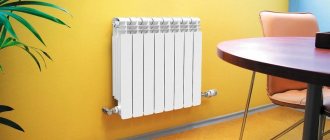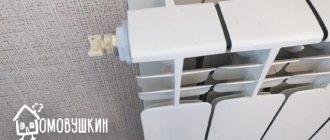Home/Heating rules/Start of the heating season
Every autumn, before the start of the heating season, residents of high-rise buildings experience discomfort because the apartments become cool. There are suspicions that utility companies are delaying the deadlines, wanting to save money. In reality, management companies cannot turn on the heating at their own discretion - there are regulations establishing the timing and procedure for this procedure. One more point: before starting the system, it needs to be tested and repaired - leaks and air locks often occur. It takes time to fix these problems so that there are no problems in winter.
Attention
The decision to turn on the heating is made by local governments, and not by the management company and TSN. The exact date has not been established; the law requires that you be guided by the weather. The heating season should begin if the average daily temperature remains below 8 degrees for 5 days. If the heat supply is delayed, residents have the right to complain to the organization servicing the house, demanding that the problem be solved and at the same time recalculated. If utility workers are inactive, you can contact the Housing Inspectorate, Rospotrebnadzor, or the district Administration.
What to do if the heating is not turned on for a long time
The procedure for complaints regarding the failure to provide a utility service or the provision of a utility service of inadequate quality is the same.
It is described in detail in the article about the problem. But the essence of such appeals is different. If the problem of hot, rusty water can be considered as a certain discomfort, then the increasing cold outside the window, followed by a cold snap in the apartment, cannot be called an ordinary everyday inconvenience. Therefore, the emphasis of all your statements should be placed on a direct threat to health, the inability to avoid hypothermia, as a result of the lack of heating in the apartment.
The transfer of heating/heat supply systems to summer mode/switching off the heating is carried out only after the order of the person responsible for housing and communal services (deputy mayor for these issues) has been adopted and signed (at least in our Volga region, as our regional media inform us ). Three factors are taken into account:
- Season/time of year - they will not turn off the heating systems in December, January, or February. Heating systems are turned off in the spring - from early April to mid-May (depending on the region)
- Weather forecast. The decision to end the heating season is made by the relevant persons in accordance with weather forecasters, taking into account the likelihood of sudden cold snaps (if prolonged frosts are predicted, the heating shutdown dates are postponed).
- Temperature outside - if the average daily temperature for at least 5 days is +8 degrees or higher. The transfer of heat supply systems to the summer period (switching off heating systems) should begin on the next day after this (5-day) period.
To turn off the heating, the ambient temperature must be + 8 for five days. Or you can calculate the day of the shutdown yourself. It is necessary, starting from the day the heating is turned on, to add to this day the heating period of your region. Get the exact day of heating shutdown in your region. The heating period is the number of days during which heat is supplied to apartments and other buildings. For example, for Moscow the heating period is 145 days, for Cape Chelyuskin it is 311 days.
All heating periods for Russia can be found on the website.
As far as I know, the heating is turned off when the average daily air temperature outside reaches eight degrees Celsius. But very often I notice that in fact, this is not entirely true. Typically, the heating season ends in April, when the average daily temperature significantly exceeds the established norm.
When is fluid replacement required?
In order to start the heating system, in some cases it is necessary to fill in new coolant. This may be required in the following situations:
- This procedure is desirable at the very beginning of the heating season. It is recommended to do this during the first start of the system.
- If for some reason the drain was performed. After this, you need to ensure that it is filled with new coolant.
- If repair work has been carried out, the water needs to be replaced with new one.
Using cast iron radiators, sometimes leaks appear when the heating is turned off and the water is not drained. In such situations, after the end of the season, the coolant is removed from the system. However, there is then an increased risk of corrosion. Therefore, it is more profitable for the technician to check and fix the problems rather than remove liquid from the pipes and radiator.
If the coolant quickly becomes dirty, it is recommended to replace it regularly at intervals that depend on the severity of the problem.
Before the first start, you need to check the serviceability of the equipment Source stroim-domik.ru
Reasons for untimely start of the heating season
It would seem that with such good legislation and the responsible attitude of public utilities to their responsibilities, there is no reason to doubt that heating in our apartments will be turned on this year. Why do particularly impressionable citizens regularly annoy officials with numerous complaints and incomprehensible questions about how they are supposedly freezing and when they will turn on the heating?
Unfortunately, there are plenty of reasons to doubt the timeliness of heat supply; I will list only a few:
An ordinary bungling superimposed on force majeure circumstances. An example from the Vologda region, where an entire village was left without heating in November 2022. The reason is that the local boiler house was unable to supply fuel due to washed out roads. According to the logic of local authorities, in order to deliver fuel, the soil needs to freeze for 2 weeks at minus 10-15°. This is such a vicious circle, it turns out that in order to warm up, you first need to freeze.
Such cases, despite their absurdity, often happen every year and there is no complete certainty that something similar will not happen next year in your city, with your home.
If you strictly follow the fifth point of the mentioned resolution and the unpredictable vagaries of the weather, then the supply of heat, on completely legal grounds, will easily be postponed to the beginning of November. For example, the air temperature in Perm on October 16, 2022, day and night was +10 degrees, although on September 11 at night it was +3°, and if the Perm authorities had strictly followed the instructions, and not common sense, then the Perm residents would have received warmth in their apartments no earlier than 23 October.
There are often cases when during the so-called preparatory period, no one prepared anything, and winter came, somehow again unexpectedly. Sad but true! An emergency patching of problem areas begins, searching for resources for which there are no resources in life, but gradually everything, in some miraculous way, returns to normal. But the citizens had to freeze once again for a month or two, but these are the costs of the harsh Russian climate.
It is easiest to scold officials from housing and communal services; they are almost ethereal in their inaccessibility and isolation from the needs of the administration, but most often the reasons for poor-quality heat supply are much closer and in order to solve them it is not necessary to communicate with the President. The goodwill of the residents of the house and the willingness to fix the problems on their own are enough.
Technical problems with heating
Low intra-system pressure and, as a result, poor coolant circulation. The malfunction occurs due to increased hydraulic resistance of the system, or, more simply put, clogging of pipelines, filters, and shut-off valves.
- Periodic airing. It is possible that the cause of such a malfunction was laid down at the design stage or was admitted during installation work.
- Insufficient coolant temperature. Most often, temperature loss occurs due to insufficient thermal insulation of the heating main, but it may very well be that the thermal load on heating was initially calculated incorrectly.
- Imbalance and improper adjustment of the heating system.
Not all problems with heat supply are related to the depletion of the resource of the in-house heating system. Sometimes, the culprits for problems are the residents of the house themselves. Or rather, only part of them. Particularly advanced citizens consciously or unconsciously change the design of the system, disrupting the uniform distribution of heat on all floors. Here are typical examples of homemade products:
- Increasing the number and (or) area of radiators.
- Connection of additional heating devices. Water heated floor, indirect heating water heater.
- Installation of an additional radiator for heating a balcony, loggia.
What to do with cold batteries
You need to find an agreement on the provision of heat supply services, which contains the address and telephone number of the organization. You can also find the emergency number there. This is where you should go. According to Resolution No. 354, such information is indicated on the notice board, which should be located at each entrance.
Then you need to call the emergency dispatcher. When calling, indicate your name, address and describe the problems that have arisen. The call is recorded in the log as confirmation of the call. Within two hours, a specialist must be sent to the specified address to find out the cause of the situation.
If the lack of heat is caused by a utility failure, the dispatcher will report this immediately. Major breakthroughs and accidents are eliminated quickly, so there is no need to worry.
The situation is worse if one riser does not work or the heating does not meet the standards. In such a situation, utility workers are in no hurry to establish a heat supply, especially if we are talking about an old building or a problematic new building. In such a situation, you need to complain and demand a recalculation of the fee for the service.
How to file a complaint
In such cases, a written appeal is written to the management company, housing cooperative, homeowners association, which service intra-house networks. If there is low pressure in the pipes and low water temperature, in accordance with No. 190-FZ dated July 27, 2010 “On Heat Supply,” you should contact the heating network or heat supply organization. Be sure to ensure that the request is included in the incoming documentation log. Now you can submit an application through your personal account - it’s simple, convenient and saves time.
The complaint is written in any form. It indicates the name of the organization with which the heat supply agreement was concluded, the applicant’s details and address. The situation is briefly described. Date and signature are added. If there are documents - acts, photographs, receipts, they are attached to the application.
The organization to which the complaint is sent is obliged to respond promptly. A specialist will be sent to the address who will confirm the poor provision of the service and draw up a corresponding document. If the management company, housing office, housing cooperative, Heating Network, REU have ignored the appeal, you should contact the Housing Inspectorate, the prosecutor's office, Rospotrebnadzor and the city administration. In many localities there are “hotlines” that accept calls on such issues.
Where to go with a specific heating problem
- Utility accidents are associated with wear and tear of communications. A common winter problem. It is necessary to call the heat supply or heating network organization and call the emergency service.
- Low temperature - wanting to save fuel, thermal engines heat the media slightly, below the temperature norm. In this case, a complaint is filed with the heat supply organization.
- Poor performance of intra-house communications - wear, blockages, problems with return lines, miscalculations in design. Contact the management company, housing cooperative or other organization servicing apartment buildings. You can additionally complain to the city administration and Rospotrebnadzor.
Blockage in the battery - how to identify and fix it
A common indoor cause of cold radiators is clogged radiators. Blockages occur due to deposits and dirt. You can determine the problem by opening the Mayevsky tap. Dirty liquid will leak.
Repairs are carried out as follows:
- The inlet valve is closed.
- The device is disconnected and disassembled.
- Clogged elements are washed under pressure in the bathroom. Then a solution of vinegar or calcined salt is poured into them and washed again.
- The washed elements are installed in place.
It is advisable to remove blockages in advance, in the warm season.
Malfunction of the radiator shut-off valves
A sign of such a malfunction is cold at the bottom of the battery. The condition of the valves is checked, on which dirt, rust and scale may have accumulated during operation.
Contaminated elements must be washed and cleaned, and damaged elements must be replaced. If you are unsure of your abilities, it is better to call a specialist who will fix the problem.
Incorrect heating system settings
This problem is indicated by different degrees of heating of the batteries, which have different temperatures. The coolant flows into one radiator weaker, and into the other – more intensely.
Heating is regulated by increasing the supply to a weakly heated battery and decreasing it to an overheated battery. In modern devices, adjustment is done using a valve. If these steps do not help, you will have to remove the radiator and look for the cause of poor heating. There may be a blockage that needs to be cleared.
Air locks in the system
Air congestion (air lock) occurs when air enters the system. The problem is easy to guess by the characteristic “gurgling” and unheated radiator areas.
The air is released through a special tap. To do this, you will have to call a locksmith or contact the residents of the top floor yourself. The air vents are located there.
Temperature standards for heating radiators in an apartment
- When using two pipes for DHW supply, the maximum allowed temperature is + 95°C.
- When a building uses a single-pipe design, the water temperature in the heating system of an apartment building, according to GOST, should be no more than +115°C.
In order not to overpay for a resource that is not provided, you should install an individual heat meter in the apartment. Battery thermostats are also relevant for regulating the indoor microclimate. In this case, the owner will not have to measure the heating level of the coolant inside the radiator.
Recalculation of fees for low-quality housing and communal services.
If it is not technically possible to install a thermostat and an individual meter, then the only way out is to install a common meter for the entire apartment building (ODPU).
If the temperature in the heating system of an apartment building remains above +100°C for a long period, the management company and the local thermal power plant should be notified. Ignoring the situation will cause the water to boil, which can lead to a pipe break.
The heating level of the battery can be measured at home by applying a regular thermometer to the radiator. 2°C should be added to the resulting value - for more accurate measurements, an infrared thermometer is used.
What should the average daily temperature be for the start of the heating season?
The temperature schedule for the supply of coolant to the heating system directly depends on weather conditions. The start and end times of the season are affected by the average daily thermometer.
The indicator is calculated based on measurements of street temperature every three hours throughout the day. Then all indicators are summed up and divided by 8. Measurements are taken for five days in a row.
The average daily temperature according to the current standard for all regions of Russia is 8°C.
At what temperature does the heating turn off?
In order to make a decision to turn off the heating, the State Committee of Meteorologists takes average daily measurements of street temperatures.
The procedure is carried out according to the principle: every three hours during the day the environmental level is recorded. The results obtained are summed up and then divided by the number of measurements per 24 hours. As a result, the average daily temperature is calculated.
If the result of the operation is higher than 8°C, then an official resolution is issued and sent to the municipal authorities of the region. The administration, in turn, endorses the decision and sends a newsletter to the heads of local thermal power plants and housing and communal services.
Factors affecting boiler operation
In order to understand what temperature to set the water in the boiler, you need to take into account the main factors:
- the rated thermal power of the boiler declared by the manufacturer;
- outside air temperature;
- room wall material;
- quality of installation of windows and doors, as places of maximum heat loss.
It is easy to find out the thermal power of the boiler by reading the boiler passport - it is indicated for each device. Knowing the power of the boiler, you can apply the formula: 1 kW of thermal energy heats 10 m² of area. It is understood that this calculation (approximate) is suitable for creating a room temperature of +18 C with a wooden wall height of up to 2.5 m and an outdoor temperature of 0 C.
At the same time, it is believed that the house is maximally insulated - there is an unheated vestibule in front of the front door, two frames or a modern double-glazed window are installed in each window, the ceiling on the roof side is insulated with a layer of bulk insulation or stone wool slabs.
For example, the rated thermal power of the boiler is 10 kW, then, substituting this value into the formula, we get 100 m².
Let’s imagine that to heat an area of 100 m² a unit with a rating of 5 kW was chosen - insufficient power will lead to almost continuous operation of the boiler, a sharp decrease in its service life and premature failure.
Long-awaited warmth in apartments - what awaits us every year
Homeowners in apartment buildings are constantly tormented by the question of when the heating season will begin this year. There are strict technological criteria for the operation of centralized heating, which heat and power companies are forced to comply with. Based on the approved SNiP, a budget item is formed, into which state funds spent on heating public utilities and housing facilities are included. Depending on the duration of the heating season, appropriate fuel reserves are created at the thermal power plant, and a schedule of planned preventive measures is drawn up in the maintenance of heating mains.
Theoretically, the main parameter that utility services pay attention to in preparing for the new heating season is a steady decrease in ambient air temperature. If for a long time the average daily temperature outside does not exceed 10 0 C, we can expect the long-awaited warming of the microclimate in apartments
However, this is in theory; in practice, everything is much more complicated.
For example, in the Arkhangelsk region the cold period begins a month earlier than in central Russia, not to mention the southern regions. According to weather forecasters, the temperature in September can be 15-17 0 C, for example in Moscow and the Moscow region, while in the Urals and Western Siberia this figure can drop to 8-10 0 C. In each individual case, utility workers expect accurate forecasts from weather forecasters , focusing on their data in determining the expected date for the start of heat supply to the heating plant.
A long Indian summer and unexpected warming in mid-autumn can make significant adjustments to the timing of the start of heat supply to city apartments. Every year brings surprises in this regard, especially considering the constantly changing climate on our planet. A sharp cold snap in September can give way to unexpected warmth in October, when everyone is looking forward to turning on the heating. This is where confusion arises. Sometimes the energy company - the entity that supplies heat to your homes, despite the warming, turns on the heating on time. Then your apartment becomes hot, like in Africa. You are forced to open the windows and ventilate the apartment, wasting precious heat.
And vice versa. In a situation where the latest warming has delayed the timing of turning on the heating, you enjoy the warmth outside, but the cold comes again unexpectedly. In this case, both you and the heat suppliers will be caught by surprise. Sanitary rules and regulations in this case are the main documents for public utilities that give the right to start centralized heating. Otherwise, heat and power companies may be held administratively liable for violation of approved standards.
Nuances
Although the law requires that the timing of the heating season be determined by local authorities, there are still opportunities to deviate from this norm. If the communications are in order and checked for leaks and other faults, the management company can start supplying heat without waiting 5 days with an average daily temperature of less than +8 degrees. This is also allowed based on numerous requests from residents.
There are several other important nuances associated with the start of the heating season:
- Supplying heating later than 5 days with an average daily temperature below +8 degrees is a direct violation of the legislation of the Russian Federation. For this, organizations that provide such a service face serious fines.
- If apartment owners believe that the heating is turned on too late, they have the right to enter into an agreement with the heat supply organization. You can enter the exact dates of switching on and off. Then heating will be supplied at the specified time without taking into account the outside temperature. However, it is necessary to organize a meeting of residents and ensure that the majority of residents express their consent in writing. This can be difficult to do.
- If the heating has already been turned on, but the house is still cold, you should not complain right away. The system is adjusted by increasing the pressure gradually. Therefore, it sometimes takes several days for the batteries to become hot.
- It is forbidden to unauthorizedly weld pipes or install radiators with a large number of sections to make it warmer. This allows you to make the temperature of the house more comfortable, but may disrupt the operation of the heating system. Residents of other apartments will suffer - it will become cooler for them. Therefore, after some time, the relevant services will learn about such a violation. The owner will be fined and will still be required to return the old batteries.
Comments Showing 0 of 0
Bodies for filing a complaint in case of lack of heating
If problems arise with heating, poor quality is detected or the radiators are cold, do not neglect the rights of the consumer. You should complain to the official authorities.
Submission of claims is carried out sequentially, that is, without writing a statement to the Criminal Code or Housing and Communal Services, it is useless to apply to the prosecutor's office. Only after receiving refusals or due to inaction, it is allowed to send claims to higher authorities.
The list of supervisory agencies is presented on an ascending scale:
- Housing and communal services, housing cooperatives, management companies or homeowners associations;
- Housing Inspection;
- Russian consumer supervision;
- municipal department of the locality;
- local combined heat and power plant (CHP).
You can download complaint samples here:
- The inaction of utility companies.
- There is a complete lack of heat supply.
When resolving heating problems, owners must rely on current standards for supplying and turning off heat in apartments. It makes no sense to enter into conflict with the management company or RSO if the premises are not thermally insulated. Experts also note that there must be a basis for filing a complaint about insufficient heating or heat.
Monitoring the temperature in the apartment and the degree of heating of the radiators is the responsibility of the residents. If deviations from the norm are detected, the management company or the MKD board of directors should be reported.
Watch the video: “The best way to heat when there is no gas. Using the example of Finland."
Free consultation by phone! Moscow and region: ; St. Petersburg and region:
At what temperature is the heat supply turned on?
Consumers often ask themselves the question at what temperature should the heat supply be turned on?
The decree of our government dated June 23, 2006, about the procedure for providing housing and communal services to citizens. The very beginning of the heating season is considered when the daily average outdoor temperature is less than plus 8 degrees Celsius for a full five days in a row.
So at what temperature is heat supplied!?
According to the above act, at a temperature less than plus eight and if the temperature is maintained for five days in a row or with the very beginning of the heating period from October fifteenth to April fifteenth.
Also, it will be useful to get acquainted with the temperature standards from the sanitary and epidemiological service, which must be in residential premises:
Very often the heat supply in rural houses is poor. Thanks to this, you need to try traditional country house heating.
Also read: My recommendations for choosing heating pipes
Traditional heating is a good replacement in a private home
How to perform traditional heating? To install traditional heating you will need:
- heating batteries,
- pipes for connecting heating components,
- water boiler
- and much more.
You can purchase all this from our company.
We recommend: Detailed instructions on how to increase the battery
Recommendations and tips
- It is necessary to install water boilers closer to the living space, many people usually install boilers in the kitchen room, some make a specialized extension to the kitchen room, where the boiler is located.
- Based on the above, the boiler in a traditional heating system must be placed below the heat dissipators. This will increase the pressure circulation in the system, which in turn can make your home more comfortable and warmer.
Note on the topic: 5 rules for filling the heating system
What to do if you have problems?
If you have problems with cold winters and low temperatures in your home. If purchasing and installing traditional heating puts you in a difficult situation from which it is difficult to find a way out. Contact the specialists of our company, and they will install heat in your home very quickly and with the highest quality.
Our company is ready to provide all services for carrying out and connecting traditional heating of houses.
Heating in the off-season
The off-season in heating terms is the time between the heat being turned off in the spring and the supply of hot water returning to the pipes in the fall. The weather is unpredictable, so a sharp cold snap can occur at the end of spring. In some regions frosts continue until May.
The state does not have the ability to open and close the dampers of thermal power plants at the request of people. Therefore, under normal conditions it is necessary to resort to additional means of heating the premises. Most often they use electric appliances, less often gas ones.
In some private homes, additional heating is provided using a wood-burning stove and potbelly stoves.
An alternative for multi-apartment buildings is heaters running on liquid fuel, as well as:
- Oil-based radiators and convectors. Cons: high electrical energy consumption. Plus – it heats the room efficiently and maintains the set temperature for a long time after disconnecting from the network.
- Fan heater - quickly heats up the room, but also cools down when there is no power. The main disadvantage is that it dries out the air in the apartment.
- The air conditioning system is expensive, but reliable and long lasting. By installing a “split”, the owner solves two problems. In summer you can set the optimal coolness in the house, and in winter you can warm up (but only when the outside temperature is down to -5°C). Experts recommend choosing energy-saving models to reduce electricity costs.
Please note: installing heated floors in apartments and houses can also solve the heating problem in the off-season.
How to save on gas heating
The desire to spend as little as possible on heating is quite natural.
When using gas, there are several ways to save fuel:
- Installation of a gas flow meter. The problem is very relevant, since in the absence of a meter, the resource supplying organization will charge the consumer not for the specific volume of fuel consumed, but according to regional standards. The difference can be up to 2-3 times.
- Reduced heat loss. For example, a private house can lose up to 25% of heat through the roof, up to 25% through windows, up to 35% through walls, and up to 3% through a door.
- Maximum use of automation equipment. Automation will monitor the necessary parameters better than a human.
- Increasing the efficiency of equipment operation. For example, replacing an old-style burner with a more modern version can save up to 5% of gas.
- Application of new means of ventilation. These include recovery systems - this is when the exhaust pipe of a gas boiler through the wall of the house passes inside the supply ventilation pipe. Outside the house, the exhaust pipe raises the exhaust gases much higher, and the cold air from the street enters the house already slightly warmed up. The use of a recuperator allows you to save 5-10% of the volume of gas consumed.
Important points about turning off and turning on the heating
Immediately with the beginning of spring warming, many residents of the capital and other cities begin to be interested in the real days of heating shutdown. The following points are important here:
- Average daily temperature - this value takes into account all temperature indicators, both day and night. To turn off the heating, it is necessary that the indicator is not lower than +8°C and remains at this level for at least 5 days. If this condition is met, you can expect that the central heating will be turned off.
- Temperature stability - if the condition is met, and weather forecasters indicate that frosts are not expected in the region, then city authorities may decide to turn off the heating. This decision is communicated to the district authorities, who then inform the housing and communal services and give orders to turn off the heating.
The end of the heating season and the cessation of heat supply to consumers are associated with significant financial and human resource costs. The feasibility of such a decision is determined by city authorities, focusing on average daily temperatures and weather forecasters’ forecasts for future periods. These indicators are objective, and no others will be taken into account when turning off the heating.
There are a number of objective reasons that indicate that untimely shutdown of centralized heating is not a rational measure. Experts include the main ones:
Features of operation of heating mains and thermal power plants
It is important here that in order to start centralized heating, all necessary indicators must be brought to a certain level, which is established by specialists. In addition, you should create the required difference between pipelines of different levels
And, if in summer there is either no pressure at all in the heating mains, or the level is minimal, then in winter the pressure is registered at 6-7 kgf/cm² with a supply of 3-4 kgf/cm² to the reverse. To sufficiently warm up the coolant and create the proper differential, significant energy resources are required. In addition, this process takes quite a long time. For example, for heating just a small city, thousands of cubic meters of coolant pass through heating mains. It follows from this that it is simply physically impossible to quickly supply heating (within several hours after weather forecasts). The end of the 2022 heating season, as well as the beginning of the next one, according to the order, must be accompanied by appropriate service organizations, since these procedures are associated with an increased accident rate. For these reasons, it is advisable to plan and prepare a work plan for maintenance personnel in advance. During this period, all employees of such organizations will have to work in almost emergency mode. It is quite natural that a vacation schedule should be formed taking into account this moment in such a way that engineers and mechanics are fully present at the time of starting/switching off the heating.
What is the heating season
The heating season lasts from the time utilities turn on the heating until they turn it off. This period usually begins in the fall and ends in the spring. However, the exact timing is regulated by the relevant authorities.
Heating is supplied through central pipes. Such designs exist in every home. To make it easier for you to understand how central heating works, we suggest that you familiarize yourself with its process in more detail.
How does the heating process work in apartments?
- Heating of apartments is carried out using a pipeline. The pipes stretch from the city central boiler house and disperse to houses and apartments. Here the coolant is water.
- Houses can also be heated from combined heat and power plants. In this case, electricity and steam are used as coolants.
- The coolant is supplied through a developed pipe system. The pipes run in two rows. According to the first, the coolant enters the apartments, and according to the second, it returns from them.
- In apartments, heat is distributed through pipes.
Central heating has such a system. Cities with a population of millions are heated with its help. However, you have to pay for such services.
When will heating be provided in 2022 in Moscow this year the heating season will begin in October
There are certain instructions, following which housing and communal services begin the heating season. There are certain regulations according to which heat in homes must appear before October 15 inclusive. There is also a list of institutions (for example, municipal buildings, schools, kindergartens, hospitals, etc.) in which the heating starts earlier than the established deadlines. Also, utility workers are guided by the basic principle, that is, they turn on the heating if the daily temperature remains for five days at or below plus 8 degrees Celsius.
With all this, one prescription contradicts the other, because if after October 15 the air temperature is above plus 8 degrees, the heating will not be turned on for now, since this is not profitable for service providers.
Also, utility companies are required to supply heat to our homes on behalf of the city mayor, as happened last 2016
If we take into account the statistics, the heating season in the capital begins from October 1 to October 15. A little earlier than this period, municipal institutions begin to receive heat, and after them administrative buildings
Ways to warm yourself
If there are small children and old people in the house, then waiting until it gets warmer is fraught with freezing and illnesses. In addition, the temperature outside can be +9 - 10 for a whole week, and at this time the house cools down. No one will turn on the heating.
Therefore, you need to provide ways to heat your home in any case. Here are the most suitable options and those that are not advisable to use.
Some people make “warm floors” and install additional radiators, completely remodeling the heating system in the home . But provided that the coolant is not efficient enough, such actions will be of little use.
Switching to electric heating can lead to dire consequences for the apartment owner. He may pay an administrative fine for unauthorized rescheduling.
At the same time, state bodies are guided by the following laws: Civil Code Art. 293 (“Termination of ownership rights for mismanagement of residential premises”), Criminal Code of the Russian Federation, Art. 330 (“Arbitrariness”), Code of the Russian Federation 7.21 (“Violation of the rules for the use of residential premises”).
Why are such harsh measures taken and why is there “damage” and “damage” here? The point is this:
- If the system in a separate apartment is redesigned and changed, then the hydraulic regime in the general house system and the heat balance may be disrupted.
- When switching to “electrics”, the voltage and load on the network increase several times. As a result, “blackouts” affect entire areas if the trend is widespread.
As practice shows, alternative options are not always appropriate. It’s easier to get the utility companies to turn on high-quality heating in a timely manner.
If there is no other choice, then here are valuable tips on which electric heating option to choose:
- Install an inverter air conditioner with a latest generation rotary compressor. Heat is generated 5 times more than electricity consumption.
- Fan heaters. They quickly heat even a large room, are compact and easy to use, but there is a drawback - the air becomes dry and the amount of oxygen decreases.
Oil heaters are most often used, as well as floor- or wall-mounted heating convectors . To heat a room of 20 m2, a 2 kW unit is required. That is, the electricity consumption is considerable.
You should not despair if the apartment is very damp and cold. It is necessary to begin to act, to involve neighbors and authorities. The main thing is to back up all steps with the necessary documents and knowledge of the laws.
Ways to heat your home in the off-season
Fan heaters allow you to quickly heat even a large room, and at the same time they consume a small amount of electricity. Since they do not take up much space, they are convenient to store when not needed, even in a small apartment. However, it must be taken into account that their use worsens air quality - due to oxidation of the spiral material and dust combustion, the oxygen content decreases (pro
Hydrodynamic flushing
If the radiator design allows it, it will be useful to carry out hydrodynamic flushing. To implement this you need to perform the following steps:
- Pipes are connected to the radiator outlets.
- Start the washing procedure. In this case, it is necessary to visually monitor the degree of contamination of the coolant.
- The flushing procedure often needs to be repeated several times to get the water clean.
Then the integrity of the connection between the radiator and the pipes is checked. In some cases, gaskets may need to be replaced to ensure reliability.
Using a gas boiler for heating Source stroi-mario.ru
What to do if it’s warm outside and the heating is not turned off
It should be taken into account that stopping heating equipment for summer mode cannot be done instantly. The heating is turned off in a certain sequence. First of all, the heat supply to administrative buildings and industrial facilities is stopped. They are followed by residential apartment buildings and only lastly are batteries turned off in schools, kindergartens and other social institutions.
However, there is some injustice in all these decisions. At a time when it is already warm outside and the temperature of the pipeline is reduced to a minimum, residents are forced to pay the heating bill in full. You can find a way out of this situation by installing meters on heating appliances.
It is also possible to turn off the heat individually ahead of schedule. To do this, you will need a collective application and consent of all residents of the house, which is submitted to the organization that supplies heat to your region. Only after this is the shutdown performed.
Preparing the housing stock for the heating season 2017-2018
The comprehensive preparation of housing and communal services facilities for seasonal operation is regulated by regulatory requirements for people's accommodation in the autumn-winter period.
- elimination of cracks and holes in external walls, basement, attic floors, roof and places where they join each other, windows or doors;
- restoration of plaster coating, roofing, etc.;
- tidying up technical premises;
- checking the integrity of window and door fillings, door closers and vestibules;
- conducting trial fires of central heating and furnaces;
- ensuring the removal of atmospheric and melt water from descents into the basement and window pits;
- checking the quality of waterproofing of foundations, basement walls and plinths;
- checking the performance of heating stoves and installations with gas heaters, chimneys, gas ducts, internal heat, water and electricity supply systems.
Based on these recommendations, as well as shortcomings identified as a result of the spring inspection of the apartment building and its engineering systems, the management company or HOA develops an action plan to prepare for the heating season and approves it with local authorities.
The management company’s preparation plan for the heating season, in addition to technical work, includes a number of organizational measures:
- retraining and advanced training of employees providing operation and emergency repairs of boiler houses, heating points, engineering systems;
- instructing emergency service workers, maintenance workers, and janitors;
- carrying out technical inspection and maintenance of vehicles, communications, equipment, tools, cleaning equipment, inventory;
- preparation or restoration of diagrams of in-house engineering systems;
- carrying out an audit of thermal units, operability of metering devices (with replacement, if necessary), certification of the integrity of seals.
In addition, management companies and homeowners associations, when preparing for the heating season, must take into account other requirements of Rule 103:
- the degree of readiness of heat-consuming installations for operation and their provision of the thermal energy consumption regime specified in the resource supply agreement;
- absence of debt for supplied thermal energy and coolant;
The main problem in preparing for the heating season remains the highest level of consumer debt for supplied energy resources. The debt in the housing and communal services sector amounts to more than one trillion rubles, of which 800 billion are debts of management companies to resource supply organizations.
Mikhail Men, Minister of Construction and Housing and Communal Services of the Russian Federation
In accordance with the Rules for the maintenance of common property in an apartment building (approved by Decree of the Government of the Russian Federation of August 13, 2006 No. 491), responsibilities for preparing in-house engineering systems for seasonal operation are assigned to the owners of residential premises of an apartment building (in the case of direct management) or HOAs and managers companies. Financing of events is carried out at the expense of the owners.
Law on “alternative boiler house”
As for the preparation for the 2017-2018 heating season of the heating network, control over it will be entrusted to new structures - unified heat supply organizations (ETO).
On July 31, 2022, President Putin signed the federal law “On Amendments to the Federal Law “On Heat Supply” and certain legislative acts of the Russian Federation on improving the system of relations in the field of heat supply.”
The document, which received the popular name “The Law on “Alternative Boiler House”” changed the system of regulation of heat tariffs. The new model provides for the establishment of a maximum price level for the coolant, which is called the “alternative boiler house”. This is a calculated figure. It corresponds to the cost of one gigacalorie of thermal energy if consumers want to build their own (alternative) boiler house.
In addition to ensuring the uninterrupted process of delivering heat from the producer to the consumer, ETO will be responsible for the entire range of activities for the construction, reconstruction, modernization of heat supply facilities, as well as for their preparation for seasonal operation.
However, maintenance of intra-house networks, installation of heat meters and preparation of the heating unit for the heating season will remain the responsibility of management companies and HOAs.
How to measure the temperature of the water in the battery
This can be done in two ways:
- Open the drain valve, pour liquid into the container and lower the thermometer into it. Often this can only be done on the top floor. This is where measurements are taken. At the same time, it becomes possible to verify that there is no air in the heating system.
- Place the thermometer on the surface of the battery and add a couple of degrees to the obtained value. This is the simplest method, but not as accurate as the first.
There is no point in taking measurements yourself. It is better to invite representatives of the resource supply organization and the management company (MC) to measure the heating with them.
Who sets the start date for the heating season in Moscow
In Moscow, certain standards apply when heating is turned on according to the norms.
Heat supply occurs under the condition that for 5 days the average daily air temperature remains at the limit of 8 degrees and below. Even though it is still warm outside, the rooms begin to cool quickly.
According to weather forecasters, such temperatures in the Moscow region will not be established earlier than in the second ten days of October.
Several years ago, a rule was adopted according to which regional authorities have the right to decide to turn on heating prematurely if there are grounds for this.
In Moscow, the Moscow United Energy Company is responsible for the start of the heating season.
Thus, MOEK cannot begin supplying heat without receiving a corresponding order from the deputy mayor for housing and communal services.
Technically, heat can be supplied to one specific house, however, this practice is not common. Schools and clinics, hospitals and kindergartens are being connected in stages, and only then – at home.
At the very last stage, heat is supplied to enterprises - this depends on the degree of readiness of the organization itself.
According to available data, the average time to turn on the heating in Moscow is mid-October.
If five or more days have passed, it’s cold outside, and the heating is still not turned on, you need to file a complaint against the management company. The problem may be technical or economic.
In the first case, after checking the pipes by a specialist and replacing broken parts, the issue will be resolved.
Considerations and possible consequences
The management company is obliged to consider the claim to turn on the heating of an apartment building within 10 days and take appropriate measures. Based on this act, it will be possible to request a recalculation of the heating payment for the entire period when there were problems with it. For each hour that the temperature does not meet the established standards, the heating fee is reduced by 0.15% of the monthly payment. Therefore, the management company is interested in quickly establishing heat supply to the house.
If the situation does not change, you should file a complaint with Rospotrebnadzor or the prosecutor's office. If departments fail to act, you can file a lawsuit with a demand to oblige the management company not only to recalculate heating fees, but also to compensate for moral damages. The court decision is executed in 95% of cases. If this does not help, the residents of the house should hold a general meeting and discuss the issue of changing the management company or organizing TSN. This will be possible if the majority of owners vote for such a decision.
What to do if you haven't turned it on
What should a consumer do if the heat supply company does not fulfill its obligations? Try to force a recalculation because you did not receive the service, although you may have already paid for the heat. It is necessary to submit an application to the operating organization, which must send a specialist with a certified thermometer. If the temperature in the apartment is below the standard (20°C), you must recalculate it next month.
There are certain standards for heating. They are the same for all regions, but the systems are turned on at the moment when the average daily temperature in the city remains for several days at the level established by the standards.
Heat indicators may vary depending on the type of room. In hospitals and kindergartens, heat supply occurs earlier than in apartments.
If the standards are not met, an application should be submitted to regulatory organizations, after which an inspection will be carried out.











